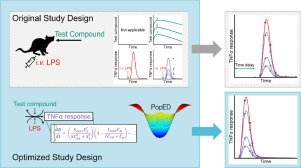Last work from Julia’s phd studies!
In this work we evaluate the study design of LPS challenge experiments used for quantification of drug induced inhibition of TNFα response and provide general guidelines of how to improve the study design. Analysis of model simulated data, using a recently published TNFα turnover model, as well as the optimal design tool PopED have been used to find the optimal values of three key study design variables – time delay between drug and LPS administration, LPS dose, and sampling time points – that in turn could make the resulting TNFα response data more informative. Our findings suggest that the current rule of thumb for choosing the time delay should be reconsidered, and that the placement of the measurements after maximal TNFα response are crucial for the quality of the experiment. Furthermore, a literature study summarizing a wide range of published LPS challenge studies is provided, giving a broader perspective of how LPS challenge studies are usually conducted both in a preclinical and clinical setting.
Link: LPS

